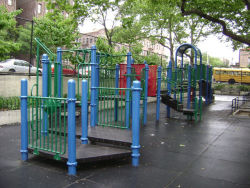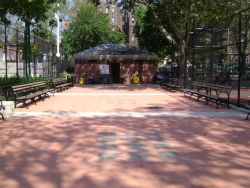Hamilton Metz Field
Hamilton-Metz Field
What was here before?
This field is in the Brooklyn neighborhood of Wingate, which was formerly known as Pigtown well into the 20th century. The area’s nickname from the numerous small animal farms in the area. Before the neighborhood was developed into a middle-class neighborhood in the 1920s, there were reports of goats and other livestock that roamed the area. Eventually, the community adopted the name Wingate after nearby George Wingate High School and Wingate Park. These were named after George Wood Wingate (1840-1928), a founder of the Public School Athletic League, for his support of school athletics.
How did this become a field?
In 1940, the jurisdiction of this field was transferred from the Board of Education to NYC Parks. At that time, the family of legislator Herman A. Metz donated several parcels of adjoining land to the City to augment the existing field.
The park’s basketball courts were rebuilt in 2014, and the synthetic turf field was replaced in 2021.
Who is this field named for?
This field honors United States founding father Alexander Hamilton (1757-1804), as well as early 1900s legislator Herman A. Metz (1867-1934) and his wife Laura A. Metz.
One of the most influential military officers and statesmen in American history, Hamilton arrived in New York from the British West Indies in 1772 where he enrolled in King’s College (now Columbia University). He was a member of the Continental Army, and after the war, he served as a United States Congressman (1782-1783) and Secretary of the Treasury (1789-1795). He died on January 31, 1804 from a gunshot wound inflicted by political rival Aaron Burr (1756-1836) days earlier.
Metz was a native New Yorker and Cooper Union graduate who spent most of his adult life in New York politics. He served as a member of the Board of Education for both Brooklyn and the City of New York, and as City Comptroller (1906-1910). Metz was appointed by Governor Charles Hughes (1907-1910) in 1907 to draft New York State’s charter. He was nominated for governor a few years later but withdrew from the race in favor of William Sulzer. He was later elected as a Democrat to the 63rd Congress (1913-1915). Metz further supported the interests of his country in World War I (1914-1918), where he achieved the rank of Lieutenant Colonel as the ordnance officer in the 27th Division.
Check out your park's Vital Signs
Clean & Safe
Green & Resilient
Empowered & Engaged Users
Share your feedback or learn more about how this park is part of a
Vital Park System




